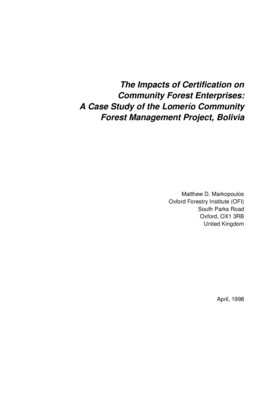Impacts of Certification on Community Forest Enterprises: A case study of the Lomerio community Forest Management Project, Bolivia

Forest certification now covers several million hectares worldwide, and yet there has been little assessment of its economic, social and environmental impacts. This report presents an impact analysis of forest certification on the Lomerio Community Forest Management Project in eastern Bolivia. Owned and managed by indigenous Chiquitano Indians, the Lomerio project secured forest management certification from the Rainforest Alliance's Smart Wood programme in February 1996. In doing so, it became the first forest enterprise to be certified in Bolivia. ~The analysis of certification at Lomerio considers the issue of whether, for community forest enterprises, the potential benefits of certification may be offset by internal constraints such as weak economies of scale, a lack of marketing opportunities, and a limited capacity to bear market risks. The analysis focuses on forest management practices; enterprise administration; finances and marketing; institutions and social relations; distribution of costs and benefits; resource tenure; and national forest policy and legislation. Under each of these themes, an attempt is made to assess both the direct and indirect impacts of certification.
Cite this publication
Available at https://www.iied.org/7544iied